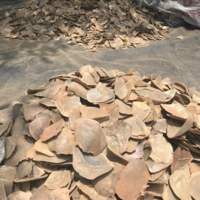Pangolins are the world’s only truly scaly mammals but sadly their scales also contribute to them being the most illegally traded wild mammals on the planet.
At the 19th meeting of the Conference of the Parties to the Convention on International Trade in Endangered Species of Wild Fauna and Flora (CITES COP19) which took place in late 2022 the world’s governments made a number of decisions on pangolins and their conservation including urging relevant countries to close domestic markets for pangolins. However, University of Oxford’s Dan Challender who co-leads Operation Pangolin, argues that in an increasingly busy conservation sector, indigenous peoples and local communities are critical to conserving species such as pangolins and that this blanket policy essentially excludes these critical players from the conversation. Dr Dan Challender says
''This blanket policy could have perverse impacts on future policy adoption in West and Central Africa, where populations of white- and black-bellied pangolins are more abundant than pangolin populations elsewhere in Africa and in Asia. The recommendations from CITES COP19 will likely make it harder for pangolin range countries in these regions to explore policies that include sustainable use and potentially domestic trade in these species, which could support pangolin conservation by providing formal incentives for indigenous peoples and local communities to harvest and use the species sustainably.''

Seized pangolin scales in Nigeria
Dr Dan Challender
Dan and his colleagues who have followed the policy making process during the build-up to and during the CITES CoP19 meeting, suggest that rather than committing to the closure of domestic markets, which may not be legitimate to key players (e.g., indigenous peoples and local communities), the West and Central African pangolin range countries should use consultative governance processes to reconfigure institutional arrangements at appropriate scales to incentivise conservation.
Options could involve the harvest of a limited number of individuals of these species annually, restrictions on hunting to designated areas, or similar measures, or may not involve consumptive use and trade of the animals. Critically, any measures should be locally determined and context-specific because that is what has been demonstrated to work. In a newly published letter the authors recommend that the CITES parties recognize that under appropriate governance conditions, formal domestic use and/or trade of pangolins could in fact contribute to their conservation. Dr Dan Challender says that
''Rather than following the suggestion of northern governments and animal protection organisations who feel compelled “to do something”, conserving pangolins will be better served by prioritising indigenous peoples and local communities in the design of rules and regulations on natural resource use in areas where pangolins occur.''
Dr Matthew Shirley, co-lead of Operation Pangolin and Research Assistant Professor at Florida International University’s Global Forensics and Justice Center added
''The simple reality is that thousands of pangolins are consumed daily, openly and with impunity across western Africa – as they have been for thousands of years. While it may not be the easy way, working with communities to improve natural resource governance to balance both human and wildlife needs will better incentivise these critical pangolin conservation stewards to help ensure a future for pangolins.''
Dr Dan Challender is an interdisciplinary conservation scientist based in Oxford University’s Department of Biology and the Oxford Martin School, who has been involved in pangolin research and conservation for more than 15 years and he and his co-authors have ongoing pangolin conservation projects in West and Central Africa. The letter is published in Conservation Science and Practice and can be found here: https://doi.org/10.1111/csp2.13117.